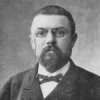Henri Poincare

Henri Poincare
Jules Henri Poincaréwas a French mathematician, theoretical physicist, engineer, and a philosopher of science. He is often described as a polymath, and in mathematics as The Last Universalist by Eric Temple Bell, since he excelled in all fields of the discipline as it existed during his lifetime...
NationalityFrench
ProfessionMathematician
Date of Birth29 April 1854
CountryFrance
people mind doe
A first fact should surprise us, or rather would surprise us if we were not used to it. How does it happen there are people who do not understand mathematics? If mathematics invokes only the rules of logic, such as are accepted by all normal minds...how does it come about that so many persons are here refractory?
facts doe language
All the scientist creates in a fact is the language in which he enunciates it. If he predicts a fact, he will employ this language, and for all those who can speak and understand it, his prediction is free from ambiguity. Moreover, this prediction once made, it evidently does not depend upon him whether it is fulfilled or not.
doe theory asks
One does not ask whether a scientific theory is true, but only whether it is convenient.
mind one-day doe
Einstein does not remain attached to the classical principles, and when presented with a problem in physics he quickly envisages all of its possibilities. This leads immediately in his mind to the prediction of new phenomena which may one day be verified by experiment.
means necessary neither nor
Thus, be it understood, to demonstrate a theorem, it is neither necessary nor even advantageous to know what it means . . . .
american-journalist relations remain replace
Thus, they are free to replace some objects by others so long as the relations remain unchanged.
american-journalist
No more than these machines need the mathematician know what he does.
american-journalist governed phenomenon succeeding
If that enabled us to predict the succeeding situation with the same approximation, that is all we require, and we should say that the phenomenon had been predicted, that it is governed by the laws.
avoiding consists infinite invention useful useless
Invention consists in avoiding the constructing of useless contraptions and in constructing the useful combinations which are in infinite minority. To invent is to discern, to choose.
american-journalist cannot cause determines due effect escapes notice
A very small cause which escapes our notice determines a considerable effect that we cannot fail to see, and then we say that the effect is due to chance.
american-journalist believe both convenient equally necessity
To doubt everything, or, to believe everything, are two equally convenient solutions; both dispense with the necessity of reflection.
american-journalist species
It has adopted the geometry most advantageous to the species or, in other words, the most convenient.
wish different looks
If one looks at the different problems of the integral calculus which arise naturally when one wishes to go deep into the different parts of physics, it is impossible not to be struck by the analogies existing.
effort difficulty
But all of my efforts served only to make me better acquainted with the difficulty, which in itself was something.